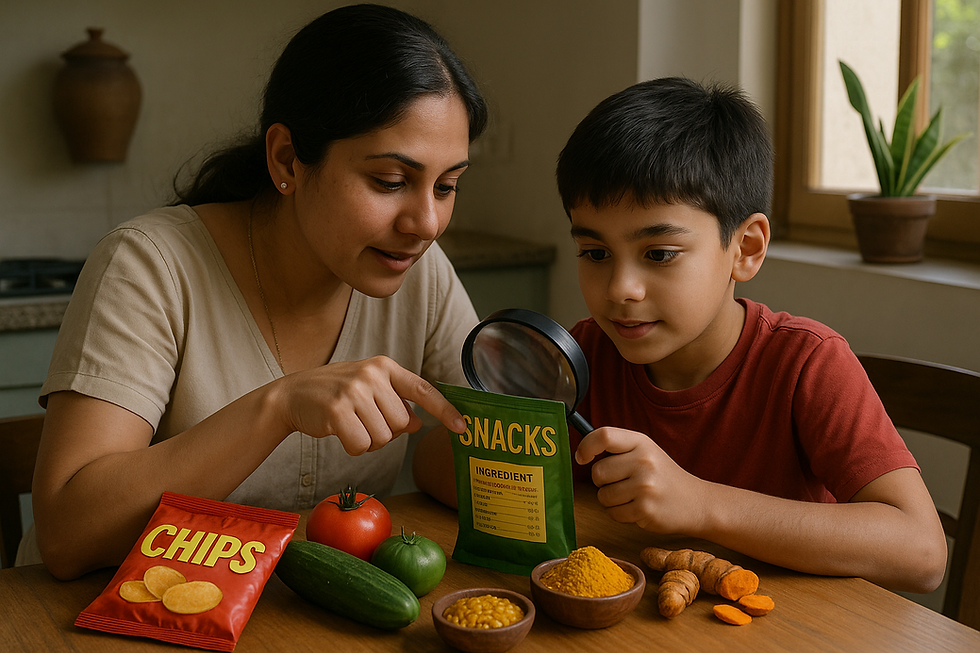How to Get Your Picky Child to Drink More Water: A Pediatrician's Guide
- Dr Tejal Risbud Rao

- Aug 6, 2025
- 3 min read

As a pediatrician, I frequently encounter parents struggling with children who refuse water. This resistance is common and manageable with the right strategies. Here's my practical guide to ensuring your child stays properly hydrated.
Getting your child to drink more water doesn't have to be a daily battle. With proven approaches, even the pickiest kids can develop healthy hydration habits that last a lifetime.
Why Children Resist Water
Children's developing taste buds naturally prefer sweeter flavors, and they may not recognize thirst cues as effectively as adults. Additionally, busy play schedules can make them forget to drink altogether.
Creative Hydration Solutions
The key to success lies in making water consumption fun and appealing rather than forcing it. These proven strategies transform water from boring to exciting for children.
Make Water More Appealing
• Add natural flavors: Fresh fruit slices (berries, citrus), cucumber, or mint leaves
• Use fun containers: Character-themed bottles, colorful straws, or cups with built-in fruit infusers
• Create flavored ice cubes: Freeze diluted fruit juice or small fruit pieces in ice trays
• Try sparkling water: Many children enjoy the bubbles (ensure it's unsweetened)
Incorporate Water-Rich Foods
• High-water fruits: Watermelon, cantaloupe, strawberries, grapes, oranges
• Hydrating vegetables: Cucumber, tomatoes, bell peppers, lettuce
• Other options: Soups, broths, yogurt, milk
Establish Hydration Routines

• Set regular water breaks: Before meals, after outdoor play, during story time
• Use visual tracking: Sticker charts or marked water bottles to monitor intake
• Make it social: Family hydration time where everyone drinks together
• Offer choices: Let children choose their cup or add-ins to feel more in control
Healthy Alternatives to Plain Water
When plain water isn't enough, these alternatives provide hydration while maintaining nutritional value. Choose options that support your child's overall health.
Acceptable Options
• Diluted 100% fruit juice: Start with 50% water, 50% juice ratio
• Milk: Dairy or unsweetened plant-based alternatives
• Herbal teas: Cooled, caffeine-free varieties like chamomile or fruit teas
• Coconut water: Natural electrolytes with mild sweetness
Important Warning: Drinks to Avoid
As a pediatrician, I strongly advise against:
• Caffeinated energy drinks: Can cause heart palpitations, anxiety, and sleep disruption
• Sweetened sodas and aerated drinks: Contribute to tooth decay, obesity, and poor nutrition
• Sports drinks: Unnecessary for most children and high in sugar and sodium
These beverages can lead to serious health complications and should never be used as hydration solutions for children.
Signs of Proper Hydration
Recognizing hydration status helps you monitor your child's fluid intake effectively. Watch for these key indicators to ensure your child stays healthy.
Positive Indicators
• Clear or pale yellow urine
• Moist lips and mouth
• Regular urination (every 3-4 hours)
• Good energy levels and alertness
Warning Signs of Dehydration
• Dark yellow urine
• Dry mouth or lips
• Fatigue or irritability
• Decreased urination
• Headaches
Age-Specific Fluid Needs
Understanding your child's fluid requirements by age ensures adequate hydration without overwhelming them with unrealistic expectations.
Age Group | Daily Fluid Requirement |
Ages 1-3 | 4 cups (950 ml) total fluids daily |
Ages 4-8 | 5 cups (1200 ml) total fluids daily |
Ages 9-13 | 7-8 cups (1650-1900 ml) total fluids daily |
Note: These include all fluids from drinks and food sources
When to Consult Your Pediatrician
Professional medical guidance becomes necessary when hydration issues persist or escalate beyond normal resistance.
Contact your child's doctor if:
• Child consistently refuses all fluids for more than 24 hours
• Signs of chronic dehydration persist
• Underlying medical conditions affect fluid needs
• Concerns about your child's hydration patterns
Key Takeaways
Remember that developing healthy hydration habits takes time and patience. Avoid making water consumption a battle, as this creates negative associations. Focus on creativity and consistency rather than perfection. Every child is different, so what works for one may not work for another.
The goal is gradual progress toward healthier habits that will benefit your child's long-term wellbeing. With patience and the right approach, even the most water-resistant child can learn to stay properly hydrated.
Call to Action: Ready to transform your child's hydration habits? Start with one strategy today and be patient as your child develops a love for staying hydrated.
References:





Comments